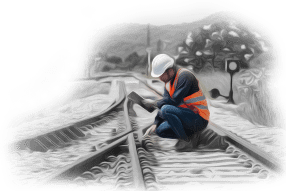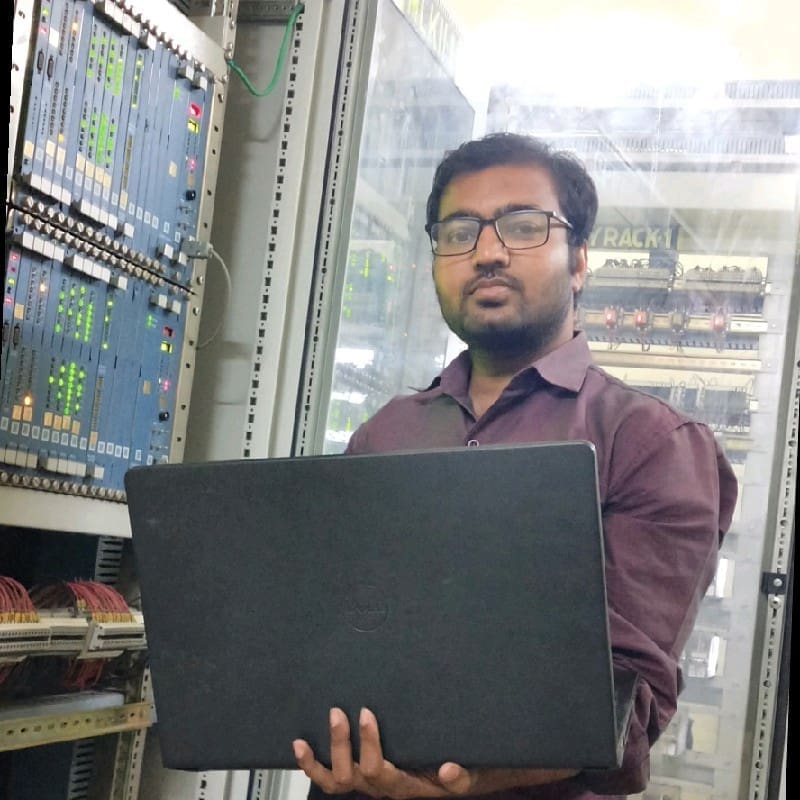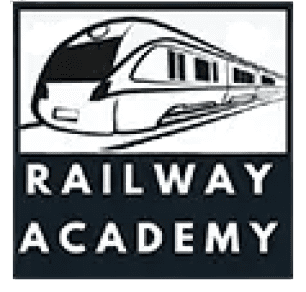12 Hours Online Certificate Course on Developing Skills in Intercontinental Rail Connectivity Projects


Duration
12 hours online course delivered by expert from railway domain

Date of start
Coming Soon!

Class Timings
Coming Soon!

Who should attend
Basic knowledge in railway signaling or experience in working in signaling projects preferred. Working professional with min. 3 years experience in rail projects.

Practical Training
Assignments covering real-life cases design, planning, and concepts

Placement Support
Placement support shall be provided through job notifications
Duration
20 hours online course delivered by expert from railway domain
Date of start
Online classes will be starting from 14th November 2023 onwards
Class Timings
8.30 PM - 9.30 PM (IST), 3 days (Tuesday, Thursday & Saturday) delivered online
Program Overview
Starting a rail project of this scale is a complex and ambitious undertaking that involves numerous stakeholders, including governments, transportation authorities, and private investors.
Key Features
- Feasibility Study
- Stakeholder Engagement
- Financing and Funding
- Regulatory and Legal Framework
- Route Planning and Design
Who can Apply ?
- Working professional with min. 3 years experience in rail projects.
- Basic knowledge in railway signaling or experience in working in signaling projects preferred.
- Engineering Graduates/ Diploma holder of any discipline.
- Those who are having electronic/ electrical/ communication subjects background.
What will you Learn ?
Feasibility Study
1Stakeholder Engagement
2Financing and Funding
3Regulatory and Legal Framework
4Route Planning and Design
5Get Certified by Railway Academy
10000+
Jobs open every year in this domain
18-30 LPA
Average Salary in this Domain
To know more about the Course
Curriculum
1. Feasibility Study:
• Conduct a comprehensive feasibility study to assess the technical, economic, environmental, and social viability of the rail project.
• Evaluate potential routes, including infrastructure requirements, land acquisition, and environmental impact assessments.
2. Stakeholder Engagement:
• Engage with the governments and relevant authorities of the countries involved to gain their support and commitment to the project.
• Establish a consortium or partnership involving key stakeholders, including government entities, international organizations, and private investors.
3. Financing and Funding:
• Identify funding sources, which may include government funds, private investments, loans, and international financial institutions.
• Develop a financial plan and secure the necessary financial commitments to fund the project.
4. Regulatory and Legal Framework:
• Establish a legal and regulatory framework that addresses the legal, technical, and safety requirements for the cross-border rail project.
• Negotiate agreements and treaties between countries to facilitate the project’s implementation.
5. Route Planning and Design:
• Finalize the project’s route, station locations, and technical specifications.
• Develop detailed engineering designs, including tracks, signaling systems, stations, and other infrastructure.
6. Environmental Impact Assessment:
• Conduct thorough environmental impact assessments (EIA) to identify and mitigate potential environmental and social impacts.
• Comply with environmental regulations and obtain necessary permits.
7. Construction and Infrastructure Development:
• Begin construction, which includes laying tracks, building stations, installing signaling and control systems, and constructing tunnels or bridges as needed.
• Implement state-of-the-art technology for high-speed rail to ensure efficiency and safety.
8. Cross-Border Coordination:
• Coordinate and collaborate with each country’s transportation and regulatory authorities to ensure seamless cross-border operations and compliance with international standards.
9. Safety and Security Measures:
• Implement rigorous safety and security measures, including cybersecurity, to protect passengers and the rail infrastructure.
• Train staff and security personnel in safety protocols and emergency response.
10. Testing and Commissioning:
• Conduct extensive testing and commissioning to ensure that all systems and components operate as intended.
• Simulate and validate train operations under various conditions.
11. Operational Planning:
• Develop an operational plan for train scheduling, maintenance, and passenger services.
• Train personnel and establish protocols for day-to-day operations.
12. Inauguration and Promotion:
• Inaugurate the rail project with an official launch ceremony.
• Promote the project to attract passengers, including business travellers and tourists.
13. Ongoing Maintenance and Upkeep:
• Establish a maintenance and repair program to ensure the ongoing safety and efficiency of the rail system.
• Regularly upgrade and modernize the infrastructure and technology.
14. Monitoring and Evaluation:
• Continuously monitor the rail project’s performance, including ridership, safety records, and financial sustainability.
• Make adjustments and improvements as needed based on performance data.
15. Cross-Border Operations: Coordinate and cooperate with other countries involved in the project to facilitate the seamless operation of trains crossing international borders.
16. Public and Stakeholder Engagement: Maintain open communication with the public, stakeholders, and governments to address concerns, gather feedback, and ensure ongoing support for the rail project.
17. Requirements with regard to strong international collaboration, significant financial investment, and meticulous planning.
18. Process of aligning with the geopolitical and economic interests of the participating countries and regions.
19. Cooperation involved between governments, private entities, and international organizations to make such a project a reality.
20. Discussion on the Rail project linking Nations under proposal stage.
Curriculum
1. Feasibility Study:
• Conduct a comprehensive feasibility study to assess the technical, economic, environmental, and social viability of the rail project.
• Evaluate potential routes, including infrastructure requirements, land acquisition, and environmental impact assessments.
2. Stakeholder Engagement:
• Engage with the governments and relevant authorities of the countries involved to gain their support and commitment to the project.
• Establish a consortium or partnership involving key stakeholders, including government entities, international organizations, and private investors.
3. Financing and Funding:
• Identify funding sources, which may include government funds, private investments, loans, and international financial institutions.
• Develop a financial plan and secure the necessary financial commitments to fund the project.
4. Regulatory and Legal Framework:
• Establish a legal and regulatory framework that addresses the legal, technical, and safety requirements for the cross-border rail project.
• Negotiate agreements and treaties between countries to facilitate the project’s implementation.
5. Route Planning and Design:
• Finalize the project’s route, station locations, and technical specifications.
• Develop detailed engineering designs, including tracks, signaling systems, stations, and other infrastructure.
6. Environmental Impact Assessment:
• Conduct thorough environmental impact assessments (EIA) to identify and mitigate potential environmental and social impacts.
• Comply with environmental regulations and obtain necessary permits.
7. Construction and Infrastructure Development:
• Begin construction, which includes laying tracks, building stations, installing signaling and control systems, and constructing tunnels or bridges as needed.
• Implement state-of-the-art technology for high-speed rail to ensure efficiency and safety.
8. Cross-Border Coordination:
• Coordinate and collaborate with each country’s transportation and regulatory authorities to ensure seamless cross-border operations and compliance with international standards.
9. Safety and Security Measures:
• Implement rigorous safety and security measures, including cybersecurity, to protect passengers and the rail infrastructure.
• Train staff and security personnel in safety protocols and emergency response.
10. Testing and Commissioning:
• Conduct extensive testing and commissioning to ensure that all systems and components operate as intended.
• Simulate and validate train operations under various conditions.
11. Operational Planning:
• Develop an operational plan for train scheduling, maintenance, and passenger services.
• Train personnel and establish protocols for day-to-day operations.
12. Inauguration and Promotion:
• Inaugurate the rail project with an official launch ceremony.
• Promote the project to attract passengers, including business travellers and tourists.
13. Ongoing Maintenance and Upkeep:
• Establish a maintenance and repair program to ensure the ongoing safety and efficiency of the rail system.
• Regularly upgrade and modernize the infrastructure and technology.
14. Monitoring and Evaluation:
• Continuously monitor the rail project’s performance, including ridership, safety records, and financial sustainability.
• Make adjustments and improvements as needed based on performance data.
15. Cross-Border Operations: Coordinate and cooperate with other countries involved in the project to facilitate the seamless operation of trains crossing international borders.
16. Public and Stakeholder Engagement: Maintain open communication with the public, stakeholders, and governments to address concerns, gather feedback, and ensure ongoing support for the rail project.
17. Requirements with regard to strong international collaboration, significant financial investment, and meticulous planning.
18. Process of aligning with the geopolitical and economic interests of the participating countries and regions.
19. Cooperation involved between governments, private entities, and international organizations to make such a project a reality.
20. Discussion on the Rail project linking Nations under proposal stage.
Programs Highlights

12 Hrs of Applied Learning (12 sessions 1 hr each)

LIVE Online & Interactive Classes

Case based sessions, LMS Support

Peer-learning & networking opportunities
Meet Our Faculty
Hear from Our Learners

Arindam Banerjee
Engineer at Hitachi Rail STS
It was a beautiful and an amazing journey with Railway Academy during the 100 Hours online certificate training in Railway Signalling for Railways and Metro. Our trainer has been supportive and really helpful. This training helped many of us to refresh our knowledge and skills on Signalling Concepts, Principles of Interlocking, Electrical & Relay Interlocking systems, Table of Control,out door design,SIP and ESP preparation, Electronic Interlocking, Modern Signalling, etc. Railway Academy has made a big impact. Thanks to all involved.

Prahlad Ghosh
Project Officer | WEBFIL LTD.
It gives me immense pleasure that I have completed "100 Hours Online Training in Railway Signaling for Railways" from Railwayacademy and finally achieved the certification. The Training course was very well-structured, informative and explanation with lots of Daily Use-Cases examples. It has certainly enhanced my Skillset & Knowledge about Advanced Signaling Concepts, Principles of Interlocking, Electrical & Relay Interlocking systems, Point Operations & Table of Control. I would certainly try to implement the learnings in our current project & in the future project opportunities. I would personally to thank the entire team of Railwayacademy and Special Thanks & Regards to Narayan Parvatikar Sir for the trainings and the individual attention towards every student. Thank You Railwayacademy.

Kirankumar Lingegowda
Lead Engineer, QuEST, GmBH
It was a beautiful and an amazing journey with Railway Academy during the 100 Hours online certificate training on Railway Signalling for Railways and Metro. Our trainer has been supportive and really helpful. This training helped me to enhance my knowledge and skills on Signalling Concepts, Principles of Interlocking, Electrical & Relay Interlocking systems, Point Operations & Table of Control, Electronic Interlocking, Modern Signalling, etc. Railway Academy has made a big impact.

Shahid Inamdar
Senior Executive – Design & Drawing, Vijaywargi Infra Engineers Pvt. Ltd.
It's a great experience with Railway Academy. The 100 Hours online certificate training in Railway Signaling for Railways and Metro helped us enhance our knowledge and skills on various aspects on Signaling. It also helped us learn about Principles of Interlocking, Electrical & Relay Interlocking systems, Point Operations & Table of Control, Electronic Interlocking, Modern Signaling, etc. This will definitely help me in my career.

Subhuti Vyas
Signalling Engineer and design works, DB Engineering & Consulting
It gives me immense pleasure that I have completed 100 hours of online training in Railwayacademy and finally achieve the certification. The training course was very well structured, informative and explanation. It has certainly enhance my skills and knowledge about Signaling Concepts, Principles of Interlocking, Modern Signaling, and Relay interlocking, point operational, table of control. I would certainly try to implement learnings in our current project and in future project opportunities. I would personally thank the entire team, special thank you regards to Narayan Parvatikar Sir for training and individual attention toward every student. Thank you so much.

Sanoj Kumar
MAINTENANCE ENGINEER (HITACHI RAIL STS)
I have completed 50hrs online Railway Signalling Design course . Mentors of Railway Academy are very good and helpful. Through this online training course I improved my knowledge and skills in Signalling concepts, Interlocking principles,SIP & ESP preparation, Table of Control. Railway Academy is very helpful for me. Thanks Railway Academy.

Priyanshu Jain
Railway signalling, Electronic Interlocking, Site Engineer, Hitachi Rail STS
Thank you so much Railway academy for gave the good and valuable time to us to Increased the knowledge and skills of railway signalling. You've made a big impact!

DINESH KUMAR THANGAMARIAPPAN
MIRSE | Solutions Engineering Manager | Frauscher Sensor Technology
Learning never exhausts the mind”. During the first half of this year, I had great opportunity to interact, collaborate and learn. Functional Safety for Railways and Metro from Railwayacademy. Thank you for all the support and encouragement.
(For Indian Students)
Fee Structure
Installment Schedule
Fee : Rs. 12000
3+ registration : Rs. 10800
5+ registration : Rs. 9600
10+ registration : Rs. 8400
EMI Offer
EMI 1 : Rs. 6500
EMI 2 : Rs. 6500
Get Started Today
12 hours Live Online Certificate Course on Developing Skills in Intercontinental Rail Connectivity Projects
₹12,000.00
Railway Course FAQs
The course promises to deliver:
- The relevant and in demand knowledge of subjects needed in the industry to help you grow in your career. After completing the course successfully, you can be confident about having knowledge to make your next career move.
- Internationally recognised certification from Railway Academy to get recognised in industry to differentiate your knowledge and get an edge in your next career transition.
These are intermediate and advanced level programs hence participants must check the eligibility criteria mentioned on this page
Majority of our students join our courses for following reasons :
- Shifting functions/roles.
- Majority of engineers consider joining our course to make a function/role transition (rolling stock to RAMS, telecom to railway signalling, maintenance to designing, designing to safety roles etc).
- Acquire knowledge to grow in your career.
- Signalling to signalling design roles.
- Signalling design to IRSE certification.
- Take transition to rail safety roles
Our courses help working professionals and freshers to acquire knowledge to excel in various railway careers.
Railway academy Certification.
Yes, Railway Academy certificates are recognised across the rail sector worldwide. Thousands of students have transformed their career through our courses. Please check success stories of professionals like you here to know about our course and certificate credibility.
We have a job support system in which we share job openings details, requirements of railway companies with our alumni through email, WhatsApp group and even social media channels.
Yes, this program will be very useful and rewarding for you if you are looking at developing your competencies in the railway industry.
100% of this training program will be LIVE Online, through the Zoom platform. You will get access to recorded lectures after each class, and this will be valid for one year to study. Once you complete the course you will have to appear in an online assessment. For more queries, please contact at [email protected]
For class timings, please refer to the Course page. Mostly we conduct our classes in the evening, at around 7 pm or 8 pm IST. Class durations are mostly for 1-2 hours per day.
- Student Support is available 7 days a week, 24*7.
- You can write to us via [email protected] OR for urgent queries, WhatsApp us at : +918420658679.
- Additionally, our course coordinator will enhance the learners’ experience by engaging with them to ensure they are on track with upcoming deadlines, submissions, offer guidance, and resolve their non-academic queries.
- You will have access to all course updates for one year.
The assessment process is mainly online conducted through a multiple-choice based assessment through a portal. The duration of a typical assessment is between 60 – 90 minutes where the student attempts the test on laptop/PC in proctored mode. You need to score 60% to qualify the assessment.
Results are announced within a week of assessment schedule and certificates are sent in pdf format within 7-15 days of results announcement.
We shall be giving you two free attempts to qualify the assessment. Beyond two attempts you shall have to pay $50 per attempt to take the assessment again.
Your access to the Support Team is for one year from purchase of course and will be available between 11 AM to 9 PM Monday to Friday. The team will help you in resolving queries, during and after the course.
Post-enrolment of course, the LMS access will be provided to you within the next 24 business hours and will be available for a year. You will be able to access the complete set of previous class recordings, PPTs, PDFs, assignments. Moreover, access to our support team will be granted instantly as well. You can start learning right away.
Yes, the access to the course material will be available for one year once you have enrolled into the course. So enroll now with our course and enjoy the benefit of one year access to the learning material.
Learning pedagogy has evolved with the advent of technology. Our online training adds convenience and quality to the training module. With our support system, our online learners will have someone to help them all the time even after the class ends. This is one of the driving factors to make sure that people achieve their end learning objective. We also provide one year access to our updated course material to all our learners. So, join our Course online now.
All our programs are non-refundable and non-cancellable. We recommend that you read all information carefully before enrolling. However, we will do everything to ensure you have a smooth learning experience with us.
Yes. We have EMI options for the LIVE online Courses. Please refer to the Course page for details. You can also make the payment through credit card and convert it into easy EMIs of your choice. At the time of checkout these offers will be shown by our financial partners.
Yes, you can contact us at [email protected] to refer your friend. Our team shall contact you to share referral benefits.
We have group and corporate discounts up to 30% based upon the number of enrolments. Please write to us ([email protected])if you would like us to give a presentation to your training manager/HR manager to offer this course with corporate discounts.
Once you make the payment, you will receive a payment receipt in your inbox confirming your order has been successful or not. In case your order is not successful please contact [email protected] with the screenshot of the email received, our team will resolve the issue. Once your order has been successfully processed, you will receive another email within 24 hours with login credentials of our learning management system where you will get class notes, session recordings for self study. For any support after you purchase a course please contact us at [email protected] or whatsapp us at +918420658679























